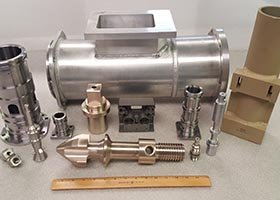The CNC Turning vs. CNC Milling Process
WHAT’S THE DIFFERENCE BETWEEN CNC MILLING AND TURNING SERVICES?
CNC turning services and CNC milling services are two of the most common machining processes used throughout the modern manufacturing industry.
As their names suggest, both of these services are guided by advanced computer numerical control (CNC) technology. However, where they differ is in their approach to the actual machining process:
The turning process uses stationary tooling pressed against a rotating workpiece – like an industrial spit roast. In contrast, the milling process uses rotating tools to machine a stationary workpiece – like a sculptor chiseling a statue.
AN OVERVIEW OF THE CNC TURNING PROCESS
CNC turning machines, or lathes, are optimized for the production of precision cylindrical parts. At the heart of the lathe machine is a chuck which grips the metal workpiece that will be machined. The lathe then spins the chuck, and consequently the workpiece, up to extremely high rpm speeds.
As the workpiece spins, a stationary cutting or grinding tool is pressed continuously against the surface of the metal. The positioning of the tool, the pressure applied, and the speed of the workpiece are all carefully CNC-controlled to remove unwanted material with absolute precision. This precision enables the lathe to ultimately produce custom-machined parts with consistent close-tolerance geometries.
The Key Advantages of CNC Turning Services
Highly efficient machining process for cylindrical parts.
Yields excellent surface finishes.
Can offer increased throughput at lower production costs for some projects.
AN OVERVIEW OF THE CNC MILLING PROCESS
CNC milling machines use a rotating cutting tool which machines the surface of a stationary workpiece according to a preprogrammed part design. The workpiece is held firmly in place, while the tool automatically chisels away all unwanted material. Multi-axis milling machines, such as J&E’s 4-axis CNC mills, are able to precisely position the cutting tool on numerous planes to accommodate even more complex geometries.
The Advantages of CNC Milling Services
Flexible custom machining solutions for a wide range of products.
Versatile machining capabilities for flat, sculpted, and metal block components.
Unparalleled design flexibility for custom prototyping applications.
CUSTOM CNC MILLING AND TURNING SOLUTIONS FOR YOUR APPLICATION
At J&E Companies, we offer custom CNC turning and milling services from several of our state-of-the-art production facilities. Our cutting-edge CNC equipment includes 10 fully outfitted turning stations (including multiple Swiss machining centers) as well as 20 precision milling machines.
Our versatile CNC machining technology enables us to efficiently accommodate both low- and high-volume orders – from prototype products to full-scale production runs.
Having such a large number of machines allows us to organize workflow into distinct categories, such as long run, short run, prototyping, specialty and weldment projects. Using this strategy, we always have ample room for overflow, and it also allows us to offer “Speed to Market” programs that help our customers stay ahead of the competition.
We operate some of the most accurate and productive CNC milling and turning machines on the market today. Multi-axis machining with live tooling allows for simplified setups and fast cycle times. With our range of equipment capabilities, we supply small diameter Swiss machined parts as well as parts with diameters of up to 17.25”. Our milling envelope measures 100.0” in length x 60.0” in height. Materials we commonly work with include aluminum, cold rolled steel, stainless steel, and a variety of other metals. We also machine close tolerance parts from plastics, composites, and other non-metals.
Our CNC machining capabilities enable us to provide targeted solutions for a variety of markets. For example, using our largest machining center, we process 8.0’ x 8.0’ x 3.0” thick plate to produce large scale parts for industrial machinery and heavy equipment. When CNC machining is combined with our grinding capabilities, we create precision parts for use in medical equipment, industrial machines, and other applications that make use of high-value parts with close manufacturing tolerances.
To ensure machined parts conform to specifications, we carry out CMM inspections and furnish reports and samples per customer requirements. As a single-source solutions provider, we offer a range of additional services, performed either in-house or by qualified vendors, to manage end-to-end production needs.
Get in touch to discuss the details of your custom CNC machining project and discover our superior DFM capabilities.

